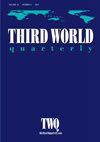Between hunger and contagion: digital mediation and advocacy during the COVID-19 emergency in Delhi
IF 1.8
2区 经济学
Q2 DEVELOPMENT STUDIES
引用次数: 0
Abstract
When COVID-19 struck India in March 2020 the central government announced a nationwide lockdown to slow the spread of the virus. In Delhi, the suspension of normal economic and social life precipitated a crisis of hunger for the thousands who depend on daily wage labour to feed their families. Many of these workers were unable to access the city’s Public Distribution System for subsidised food supplies because they lacked the correct paperwork. In response, the Delhi government implemented an online system, known as E-Coupons, through which those affected could apply for emergency rations. However, this digital system proved complicated to navigate for the marginalised people that it was aimed at. In the east Delhi neighbourhood in which this research took place brokers offering digital connections and online form-filling services proliferated in the crisis, but often provided unreliable or incomplete support to those in need. Recognising the need for digital mediation and support for the marginalised we argue that networks of reliable community advocates are required if welfare bureaucracies are to be digitised through mobile governance projects such as E-Coupons. The human mediation and advocacy, which underpins these schemes should be acknowledged and included in system design.饥饿与传染之间:2019冠状病毒病紧急情况期间的数字调解和宣传在德里
2020年3月,当COVID-19袭击印度时,中央政府宣布在全国范围内实施封锁,以减缓病毒的传播。在德里,正常经济和社会生活的中断引发了成千上万依靠每日工资劳动养活家人的饥饿危机。这些工人中的许多人无法进入该市的公共分配系统(Public Distribution System)获得补贴食品供应,因为他们缺乏正确的文件。作为回应,德里政府实施了一个名为e - coupon的在线系统,受影响的人可以通过该系统申请紧急口粮。然而,事实证明,这个数字系统对于它所针对的边缘人群来说是很复杂的。在进行这项研究的东德里社区,提供数字联系和在线填写表格服务的经纪人在危机中激增,但对有需要的人提供的支持往往不可靠或不完整。认识到需要数字调解和对边缘化群体的支持,我们认为,如果要通过e - coupon等移动治理项目将福利官僚机构数字化,就需要可靠的社区倡导者网络。作为这些计划基础的人的调解和倡导应得到承认,并列入制度设计。
本文章由计算机程序翻译,如有差异,请以英文原文为准。
求助全文
约1分钟内获得全文
求助全文
来源期刊

Third World Quarterly
DEVELOPMENT STUDIES-
CiteScore
4.10
自引率
15.00%
发文量
137
期刊介绍:
Third World Quarterly ( TWQ ) is the leading journal of scholarship and policy in the field of international studies. For almost four decades it has set the agenda of the global debate on development discourses. As the most influential academic journal covering the emerging worlds, TWQ is at the forefront of analysis and commentary on fundamental issues of global concern. TWQ examines all the issues that affect the many Third Worlds and is not averse to publishing provocative and exploratory articles, especially if they have the merit of opening up emerging areas of research that have not been given sufficient attention. TWQ is a peer-reviewed journal that looks beyond strict "development studies", providing an alternative and over-arching reflective analysis of micro-economic and grassroot efforts of development practitioners and planners. It furnishes expert insight into crucial issues before they impinge upon global media attention. TWQ acts as an almanac linking the academic terrains of the various contemporary area studies - African, Asian, Latin American and Middle Eastern - in an interdisciplinary manner with the publication of informative, innovative and investigative articles. Contributions are rigorously assessed by regional experts.
 求助内容:
求助内容: 应助结果提醒方式:
应助结果提醒方式:


